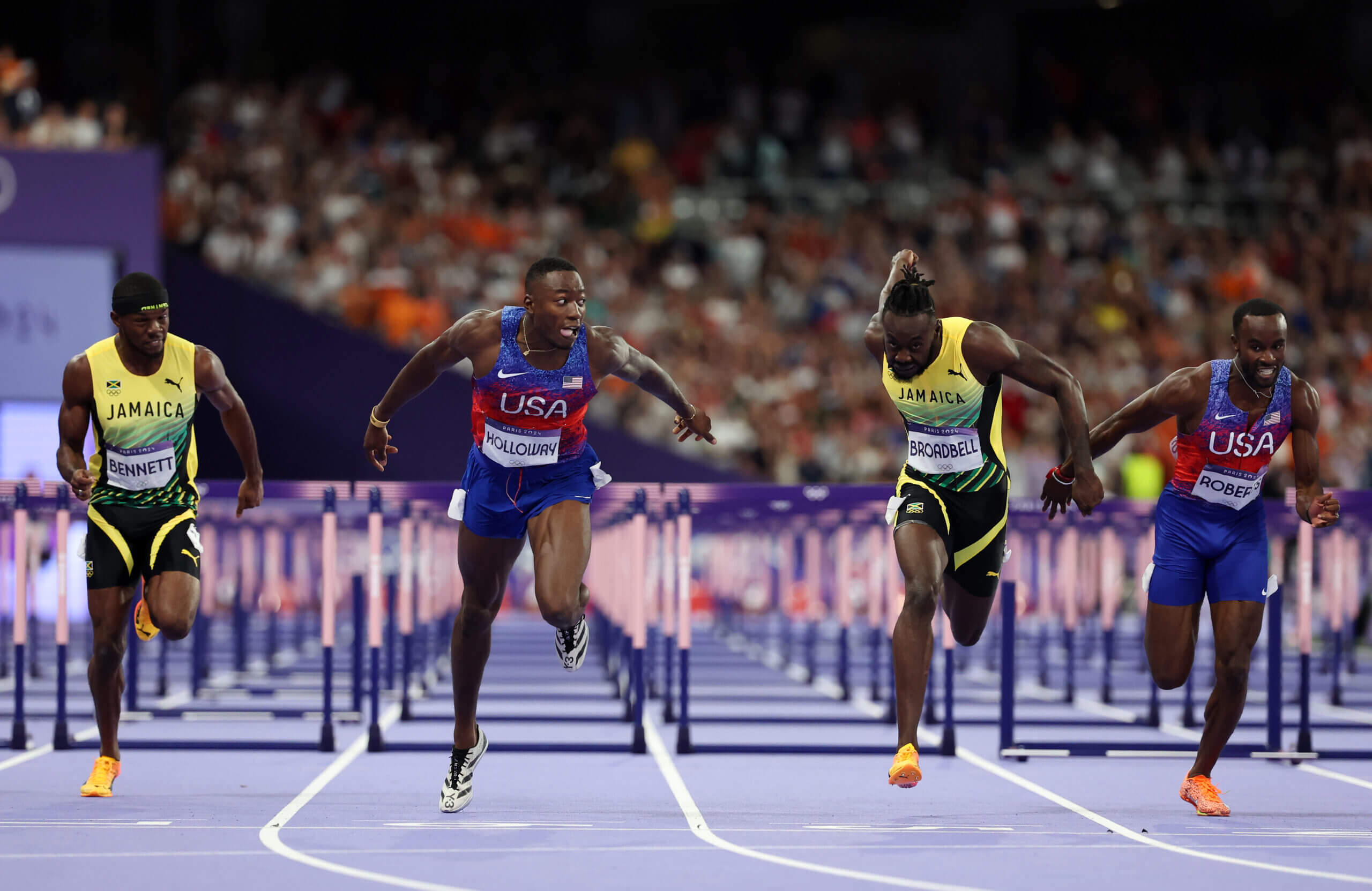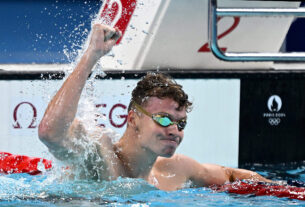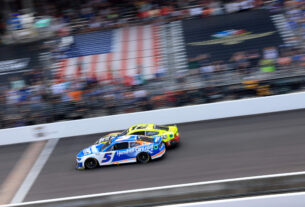SAINT-DENIS, France — Grant Holloway rested his hands atop the sixth hurdle on the straightaway at Stade de France. The 110m hurdles final was moments away and anyone who understands history, understands Holloway’s other-worldly talent, and appreciates symmetry, could easily tie all these threads together.
Tokyo 2020. Holloway, leading the 110m hurdles final, ready to answer all the expectations — the experts’, the fans’, his own. He was the world champion and clear favorite. That was, until, a herd of bodies landed over the seventh hurdle and suddenly Holloway’s gap was gone. He didn’t nick a hurdle or stumble. No, none of that. He simply broke form. Jumping too close to those 42-inch hurdles, he began moving up and down, instead of steaming forward. Instant death in hurdles.
Jamaican Hansle Parchment took the shovel and patted down the dirt. He edged Holloway, by a blinking .05 winning, and took the Tokyo 2020 gold.
But now, a new image.
Thursday at Stade de France, Holloway ripped over the seventh hurdle, kicked through three strides; ripped over the eighth, kicked through three more strides; ripped over the ninth; then the tenth.
A time of 12.99. A massive exhale at the finish line. An Olympic gold medal that seals his place among the great hurdlers in American history.
Grant. Holloway. 😤
DOMINATION on his way to 110m hurdles gold! #ParisOlympics pic.twitter.com/G3bqBRXYsD
— NBC Olympics & Paralympics (@NBCOlympics) August 8, 2024
“What are they gonna say now?” Holloway said afterward, grasping an American flag and pulling it over his shoulders.
Holloway is the first American to win 100m hurdle gold since Aries Merritt in London 2012. He was followed by fellow American Daniel Roberts in second, taking silver. Freddie Crittenden, ranked No. 4 in the world, couldn’t complete the American podium sweep, finishing sixth.
Rasheed Broadbell of Jamaica took bronze in 13.09.
Holloway led from the start and never wavered. Something that felt a long time coming.
As he was in 2020, Holloway arrived Thursday as the clear favorite. By a good margin, mind you. He came to these Olympics holding the second-fastest 110m hurdle time in history of 12.81 seconds, set at the 2020 U.S. Olympic Trials. He ran the fourth-fastest time in history, 12.86 seconds, in this year’s trials, despite clipping the eighth hurdle. He was a three-time world champion in the 110m hurdles and the world-record holder in the 60m indoor.
But that, in part, has been Holloway’s issue. Off the blocks, he’s as good as anyone in recent history. He’d be unbeatable if he closed as well.
The finish in Tokyo revealed the vulnerability.
So Holloway called someone who might know what to do — Merritt.
“Kind of out of the blue,” Merritt said by phone Thursday.
Holloway has long worked with Mike “Mouse” Holloway (no relation), the legendary University of Florida coach, but wanted another opinion. Merritt watched video. The two talked. More video. More talk.
Merritt’s winning run in London was 12.92 seconds spent gradually building a lead hurdle by hurdle until edging American Jason Richardson by .12 seconds. Like Holloway, he was an extremely technical hurdler, searching for every hair out of place. Unlike Holloway, he was a closer. That’s what he pointed out in those conversations with Holloway.
“In the hurdles, you have to be borderline fearless, but stay focused,” Merritt says. “The idea is, you want to be hurdling at the edge of out-of-control. There can’t be technical breaks at the end of the race. You can’t start cutting it off and rushing. The goal is to run right, not run fast.”
The distance between the final hurdle in the 110m hurdles and the finish line is 14.2 meters. About 45 feet. About the length of a school bus. About the height of the Hollywood sign, that one that Grant Holloway is now going to run under four years from now as an Olympic gold medalist.
In Tokyo, Holloway landed over the final hurdle suddenly even with Parchment, then flailed through his final steps, turning his head to the right, seeing the Jamaican pass.
In Paris, Holloway was upright and strong through the first eight hurdles, before catching cramp at the ninth. Which leg? “Both,” he said. The slightest falter at the end wasn’t enough to lose the lead he’d built. He still added another sub-13 team to his résumé and finished with a lean alone.
“This was not a redemption moment, at all,” Holloway said. “Tokyo was three years ago. Obviously, Hansle had a great race. This was my time.”
The win reclaims an event dominated by Americans through the 20th century, when the U.S. claimed 17 of a possible 22 golds. Since Allen Johnson’s win in Atlanta 1996, five of the last six Games ended with the gold going elsewhere. The lone exception was Merritt, whose gold in London was 12 years ago to the day.
Holloway was 14 back then. The son of a retired U.S. Navy officer, Stan Holloway, he attended Grassfield High School in Chesapeake, Va., where he was all-state everything — sprints, high jump, long jump, and in football. That’s where things got tricky.
Heading into his senior year of high school, Holloway was a three-star wide receiver with scholarship offers to Georgia, Clemson, Michigan, Tennessee and other powerhouses. He ultimately decided between playing football at Georgia or running track at Florida.
Spurning the spotlight of football, Holloway did his own thing. He chose track, saying he preferred the heat of individual sports. Then he went on to win a handful of NCAA titles at Florida.
Now he’s an Olympic gold medalist, one oddly lacking the swagger and show of other sprinters. Holloway has said recently that he doesn’t sell tickets, that he is not the needle-mover.
He might need to rethink that.
“The collection is finally complete,” he said. “To have world indoors, Diamond Leagues, world outdoors — all titles, and now, official Olympic gold is great, so I am just happy and ecstatic. The relief is finally off the shoulder.”
Required reading
(Photo: Hannah Peters / Getty Images)





